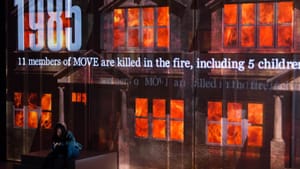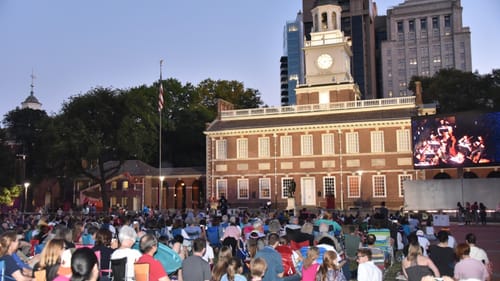Stay in the Loop
BSR publishes on a weekly schedule, with an email newsletter every Wednesday and Thursday morning. There’s no paywall, and subscribing is always free.
Safety in numbers
Opera Philadelphia presents Opera on the Mall's 'We Shall Not Be Moved'

The guiding sentiment of We Shall Not Be Moved, presented Saturday night as Opera Philadelphia’s Opera on the Mall, seemed to be one I frequently hear from composers, listeners, and even some scholars: music, especially classical music, is supposed to “make you think” but not “tell you what to think.” If it does the latter, it is perceived as somehow crass or vulgar; its nobility has been tainted.
Too pretty
This opera, which premiered indoors last year at the company's O17 festival, is gorgeous. Matt Saunders’s set design and Liz Prince’s costumes provide an effective mix of the familiar and uncanny. Librettist Marc Bamuthi Joseph’s text is exquisite and captivating, especially its spoken word passages. Daniel Bernard Roumain’s music, full of suspensions, extended chords, and pentatonic and octatonic scales, is lush and memorable, moving between Bernstein-esque, post-minimalist, jazz, and popular styles.
“Genre-crossing” classical music is fashionable these days but not easy to do; this is one of the most successful examples I’ve heard. The singers all performed superbly. My one aesthetic complaint is that the audio-recording mixing occasionally seemed off.
Yet, somehow, it all felt a little too safe. Characters avoid saying “black lives matter.” Instead, they utter awkward phrases such as “body black matters” or declare “black love matters.” The opera takes pains to come across as evenhanded, avoiding taking sides in a standoff between police and an unarmed teen who has been shot.
If anything, the cop, Officer Ramos (played by Kirstin Chavez), is given the most sympathetic posturing with the first and last solo arias. There are some effective — if utterly unrealistic — scenes in which characters confront one another.
Access vs. risk
A strength of the opera is its ability to humanize all of its characters. By the same token, the oppressive power dynamic that would have existed between the characters is unnaturally hidden. There is a back-and-forth regarding personal responsibility versus “the city” being to blame, but the opera doesn’t go far enough to examine what root forces are behind the city’s marginalizing effects.

I realize this critique might be unfair insofar as unrealistic plots that are nevertheless deeply moving are a hallmark of opera. Yet because the story felt so close to home, I found that I was less able to suspend my disbelief. It felt entirely against the spirit of MOVE, a radical collective on which the opera also never really takes a stance — which also goes against the spirit of the opera’s title.
Calling We Shall Not Be Moved too safe is also unfair given that presenting such an opera at Independence Mall is itself a risk and a bold step forward for Opera Philadelphia. I applaud the effort at making contemporary opera accessible.
Yet, even as I wholeheartedly agree that cultural institutions should keep making such efforts at accessibility, the aesthetic of people in their lawn chairs having a leisurely picnic while watching violence unfold didn’t sit right. Especially when the evening began by effusively thanking PNC and PECO, two companies that I would argue are — in different ways — responsible for ongoing poverty and despair in Philadelphia.
“This is such a cute Philly thing,” the person next to me said to her friends as they enjoyed a picnic after the first act. “I feel like I never get to do things like this.”
Under such circumstances — seemingly existing only to entertain, uncomfortable making an overt, decisive political statement — the opera felt a bit like ruin porn. It's also worth noting that the opera only seemed vulgar because it did not take a stance or pose a challenge to the audience to take action.
What, When, Where
We Shall Not Be Moved. By Daniel Bernard Roumain and Marc Bamuthi Joseph, Viswa Subbaraman conducted, Bill T. Jones directed. Opera Philadelphia. September 29, 2018, at Independence Mall, Philadelphia. (215) 732-8400 or operaphila.org.
Sign up for our newsletter
All of the week's new articles, all in one place. Sign up for the free weekly BSR newsletters, and don't miss a conversation.

 Benjamin Safran
Benjamin Safran